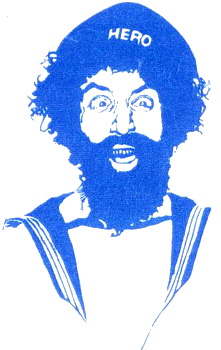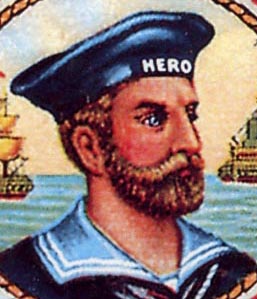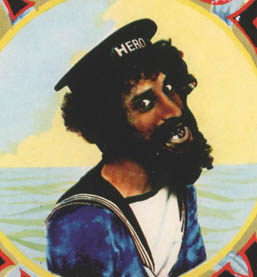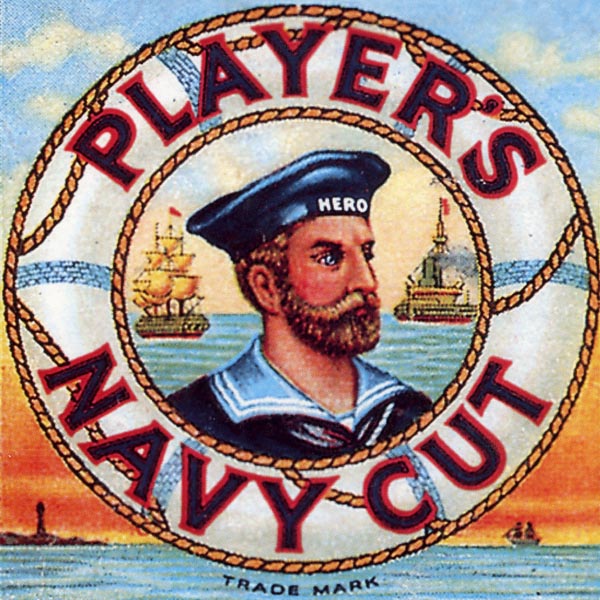 It’s
about life at sea I think.
It’s
about life at sea I think.
Procol HarumBeyond |
|
|||||||||
|
PH on stage | PH on record | PH in print | BtP features | What's new | Interact with BtP | For sale | Site search | Home |
||||||||||
Following some correspondence on the Procol Harum Facebook page about possible meanings of the phrase 'salty dog', we borrowed these often amusing comments from here. The problem many of the theorists struggle with is the supposition that the song can be – or could profit from being – pinned down to any 'basic meaning'. And it could be argued that some of them are trying to fit Keith Reid's words to an interpretation they've already thought up before looking at the song with any care. Still – nothing's better left unsaid. Only sometimes.
Okay, since I cannot find a decent interpretation of this
song anywhere I’m going to post what I think is closest to what the metaphors
are about in this song and the basic meaning:
The song is about the sinking of a ship. It could have sank [sic] rounding Cape
of Good Hope (southern tip of the African continent) which is very treacherous.
There are no survivors as noted in the lyrics ‘and no one left alive’. The rest
of the song is about their journey into an afterlife as indicated by ‘Upon the
seventh seasick day we made our port of call’. Port of call being ‘heaven’ as in
‘seventh heaven’. Another key line indicating this is ‘no mortal place at all’.
In the final verse the line ‘and burnt the mast’ indicates that there is no
going back to the mortal world, they have accepted this and their entrance into
the afterlife is met with ‘tears of joy’. The line ‘many moons and many Junes’
is a poetic way to epitomise the sense of eternity. Finally, the sinking is
noted in the seaman’s log and seen by ‘your witness’. ‘Your’ in this sense is
god as in ‘god as my witness’. Since the ship sunk [sic] at sea with no
survivors and would have been destroyed by the ocean over time there are no
human witnesses to their ‘tortured course’.
Note that ‘heaven’ can be interpreted any way one likes. It could be thought of
as ‘nirvana’ or ‘the great beyond’ or even some kind of ‘reincarnation’. In any
case the song represents sailors risking their lives for passion for the sea. It
is a story of those who never made it to their destination - lost at sea forever
- but live instead in the glory of god.
I think this is such a beautiful song because it honors all those sailors who
have been lost at sea over the centuries. The nameless and faceless many who
braved the sea with as much hope and passion as those who made it through their
journeys alive. May they all rest in peace.
 It’s
about life at sea I think.
It’s
about life at sea I think.
It’s about death is my best guess. Hindsight being 20/20, I have to think Gary Brooker’s music holds up much better than Keith Reid’s lyrics: all brain salad, little editing.
The strings and chord progressions in this song are
brilliant. They convey the feeling of floating on the sea extremely well (along
with the rhythm and seagull/wave noises). The string section sounds like it was
lifted straight out of an older piece of work - like they did with Whiter
Shade of Pale.
As for the lyrics, I’m not sure. I think death obviously has something to do
with it. The lyrics about ‘a sand so white...no mortal place at all’ sort of
sounds like they all died or discovered a paradise.
Yeah I going [sic] with the death thing to. Just the line about burning mask and stuff. Sounds to me like they destroying the ship, you know no return once ya dead. But then on the other hand it talks about death in ways that seem to conflict this such as ‘and no one leaves alive’, seems kinda obvious if they are already dead. Who knows? Amazing song though.
The story is very similar to the Mutiny on the Bounty
incident. And the mutineers landing on Pitcairn Island.
Still working on this. Just heard it today. They’re sailing
the river Styx. Their captain is Charon. But they do find themselves in Heaven
at the end. ‘The seventh sea-sick day’ -- 7 being the number of the infinite. As
with most Procol Harum songs that I’ve heard, Christian imagery and numerology
play their part, here. They fired the gun to announce their arrival, and burned
the mast because they intended never to return to their port of departure.
'A salty dog, this seaman’s log: your witness, my own hand’ is the end of the
letter. In his blindness and old age, Paul had Timothy write his last epistles.
Paul came in at the end to say, ‘I write this in my own hand,’ to prove to the
recipients that the letter was authentic, and that Paul was still alive. It
should be written like this:
Now many moons and many Junes have passed since we made land.
A salty dog, this seaman’s log.
Your Witness
(my own hand)
He felt his name was unimportant, just that he had witnessed this all, and wrote
it to us as a promise.
 Addendum:
Cape Horn is the southernmost tip of Chile. Here’s the wikipedia excerpt:
Addendum:
Cape Horn is the southernmost tip of Chile. Here’s the wikipedia excerpt:
Cape Horn is the most southerly point of South America, and marks the northern
boundary of the Drake Passage; for many years it was a major milestone on the
clipper route, by which sailing ships carried trade around the world. However,
the waters around the Cape are particularly hazardous, owing to strong winds,
large waves, strong currents and icebergs; these dangers have made it notorious
as a sailors’ graveyard.
It was on the way to Australia from England.
Alright. Getting deeper and more shallow at the same time.
This is a song about a man dreaming of his perfect love. ‘All hands on deck,’ is
the last thing any sailor wants to hear. It means there is terrible trouble
about. ‘We’ve run afloat,’ is the opposite of what any sailor would worry about.
They were bound to sea, but actually being at sea was a fearful thing. This is a
man who has left his home and his mother.
'Explore the ship, replace the cook,’ terrible freedom from Mother.
'Across the straits,’ -Keith Reid ‘straight is the gate and narrow the path that
leads to salvation.’-- Jesus Christ.
'Around the horn,’ horn being a symbol of fertility, referring to a penis.
'How far can sailors fly?’ sperm being the ultimate sailors.
'A twisted path, our tortured course, and no one left alive,’ the horrible
emptiness of the life of a single man.
'We sailed for parts unknown to man, where ships come home to die,’ every voyage
ends in the port. The port being the right vagina, in this case.
'No lofty peak, nor fortress bold could match our Captain’s eye,’ no woman can
fulfill [sic] him so far.
'Upon the seventh seasick day we made our port of call,’ after an eternity of
searching adrift, (no seasoned sailor should ever get seasick), he found his
girl.
'A sand so white, and sea so blue, no mortal place at all,’ she had white skin
and blue eyes, and was so beautiful that the sailor could not believe she was
human.
'We fired the gun, and burnt the mast, and rowed from ship to shore
The captain cried, we sailors wept: our tears were tears of joy,’ --
ejaculation, and more, an emotional connection.
'Now many moons and many Junes have passed since we made land,’ they’re growing
old together.
'A salty dog,’ he’s unworthy of this experience.
'This seaman’s log,’ semen, penis, the account of the whole story.
'Your witness. My own hand.’ the fact that he can dream it (and masturbate over
the idea) means the reality must be out there, somewhere.
Hi there, I just signed in on the purpose of exploring this
beautiful song’s lyrics.
I’m more with the thing of ‘travel through life and death’, at least a more
poetical option. I would hate to think of it as a wanker’s testament! :-)
I have loved this song since my early boyhood, it used to be the opening of one
of the very first TV programs I can recall - it was called ‘adventures’ or
something - and kept listening to it like a mantra forever.
Then I grew up and sailed around the world for many years, yes I passed the Horn
quite a few times, too, and never really felt like having to dig into meanings -
weird as it may be. The song was some sort of a ‘call’ to me, if you like, as I
was born far from the sea.
Now I’m over fifty and bolted to the mainland, but the song certainly still
evokes the freedom and fear of sailing into the blue, totally unaware of
whatever comes next, wind in your hair and eyes pointed into the infinite. And
all the confused mixed feelings and unanswerable questions that go with it. Just
like life when you face it day-to-day, and death.
'we run afloat’, though, means ‘we have a big hole in the hull’ and is perfectly
consequent to ‘all hands on deck’ as a serious alert.
What I don’t understand is: Why ‘A Salty Dog’ ? What has a dog to do with it all
?
I am not mother tongue, so possibly a hidden meaning of this expression eludes
me ?
A dog (maybe a humble person) that has spent too much time at sea ?
Thanks buddies, catch you soon.
Thanks for your notes, particularly about what ‘we’ve run
afloat’ means. Salty dog is an old English term for a sailor. Something to do
with the typical sailor of the time being low-bred and reeking of sea salts.
I came across Libertatia and James Misson in my readings, recently. Libertatia
was a libertarian, communist pirate haven set up in Madagascar in the 1600s. I
wonder if Reid might have been thinking about it when he wrote this song. Would
a ship from England in the 1600s have travelled all the way around Cape Horn
just to avoid the Cape of Good Hope? In other words, would they have sailed west
to get to Madagascar?
This song has two meanings for me - one more literal and
one allegorical. Sailors headed for the New World experience some kind of
difficulty ‘all hands on deck, we’ve run afloat!’ and dutifully follow their
Capitan’s pirate orders knowing they’re breaking moral codes: ‘A twisted path,
our tortured course, and no one left alive ‘. They eventually arrive at their
destination which appears to be uninhabited. They destroy the ship and tearfully
go ashore to start a new life. I think the listener may wonder, will they be
better men in the New World? Considering the song was created during the Viet
Nam war, I think there’s a timeless & deeper meaning that can resonate with
countless wartime experiences including conflicts in the Middle East. Soldiers
dutifully carry out acts, mostly under orders, that they may personally abhor.
The lucky ones are allowed to joyfully return home and the same question
remains, how will they re-adjust to civilian life?
Please indulge this interpretation:
Synopsis: The after death impressions of a sailor during his very emotional and
uncertain voyage to the ‘Eternal Shore’.

'All hands on deck, we’ve run afloat!’
I heard the captain cry.
The ship is afloat again after the fatal shipwreck, however, now in the astral
plane.
Afloat: Of a vessel which is floating freely (not aground or sunk).
'Explore the ship, replace the cook.
Let no one leave alive!’
Search the ship for anyone (who may be doing routine chores) pretending to
themselves that
they are still alive: they must face fact. No one can proceed under such
delusion.
Across the straits, around the horn:
How far can sailors fly?
A twisted path, our tortured course,
And no one left alive.
A very distant and difficult voyage preceded the fatal shipwreck.
How could they possibly return home?
We sailed for parts unknown to man,
Where ships come home to die
No lofty peak, nor fortress bold,
Could match our captain’s eye.
Now sailing in an astral purgatory, they trust the captain’s perseverance amidst
mirages and illusions in finding the Eternal Shore.
Upon the seventh seasick day
We made our port of call.
A sand so white, and sea so blue,
No mortal place at all.
Having, in much angst, purged their ‘sins’ (hates, fears, hurts, longings, etc.)
from all six planes of form, they reached their destination on the seventh.
No mortal place indeed!
We fired the gun, and burnt the mast,
And rowed from ship to shore
The captain cried, we sailors wept:
Our tears were tears of joy.
Thoroughly exhausted, empty, and profoundly grateful, they are Home.
Now many moons and many Junes
have passed since we made land.
The earthly life is hardly remembered now.
A salty dog, this seaman’s log:
Your witness my own hand.
‘This is my experience.’
I think, this song is an illustration to a British movie Mutiny on the Bounty 1962 (remake of the Oscar Winning original made in 1935). The crew of the British Navy ship Bounty went on riot against the crude captain. They let the captain go back to England on the small boat, and fled from the chase to the unknown island, being lead by senior officer, played by Marlon Brando. They have found the beautiful refuge, paradise like island with plenty of food and water, but their new captain died, trying to save a navigation instrument from the ship, burnt by the crew members. This a sad story of separation from the Mother Land. Salty Dog could have been a slang name for a typical sailor.
This actually is sort of a vague song, but I believe that
it tells about the death of an old seamen (referred to as the salty dog) who
runs into a captain he had that was cruel. The crew mutinied from the ship, as
indicated by the passages like ‘our tortured course’
 So now
the author and the rest of the crew that escaped the ship head off, not knowing
where they are going. They find land and make landfall. The captain comes across
them many years later, when they meet ... in death.
So now
the author and the rest of the crew that escaped the ship head off, not knowing
where they are going. They find land and make landfall. The captain comes across
them many years later, when they meet ... in death.
At least that is my idea. Probably stupid but it’s what I think.
A [sic] believe this to be a song about a sinner’s journey
to repentance...or more specifically an addicts journey to sobriety
‘All hands on deck, we’ve run a float,
I heard the Captain cry.’
As opposed to using the common term ‘run aground’ the lyrics suggest that the
captain is no longer in control. The ship and it’s [sic] crew is now at the
mercy of the sea or ‘God’ if you will.
‘Explore the ship, replace the cook,
Let no one leave alive.’
This may be a suggestion to take inventory of your life. At this point I believe
we can assume the ship is the embodymen [sic] of one’s life. It has reached the
end of its voyage. Control has been relinquished.
‘Across the straits, around the horn,
How far can sailors fly?
A twisted path, our tortured course,
And no one left alive.’
I believe ‘sailor’ to mean sinner. The question being asked is ‘After such a
sinful life can this sinner find peace (heaven)?’
‘We sailed for parts unknown to man,
Where ships come home to die.
No lofty peak, nor fortress bold,
Could match our captain’s eye.’
This could be the voyage of repenting. The arduous journey one must take to make
amends or find sobriety.
‘Upon the seventh seasick day,
We made our port of call.
A sand so white, and sea so blue,
No mortal place at all.’
Having atoned for one’s sins, the sailor has found heaven or at least made peace
with oneself.
‘We fired the guns [sic], and burned the mast,
And rowed from ship to shore.
The captain cried, we sailors wept,
Our tears were tears of joy! ‘
Left the sins behind and moved on to a better place.
‘Now many moons and many Junes,
Have passed since we made land.
A Salty Dog, the [sic] seaman’s log,
Your witness, my own hand.’
This is my story of my repentance.
As a whole, I believe the song is ultimately about repentance. However, another
parallel, as mentioned, could be the journey to sobriety. This especially
occurred to me with the mention of the ‘seventh sea sick day’. This could be
alluding the seven day period of addiction withdrawal during rehab. Considering
the time period the song was written, this could be the most likely subject.
To me it is a very simple straightforward song about a ghost ship. The lyrics are hauntingly clear. It may have been inspired by a book or history. It reminds me of some of the stories my father (a merchant marine) used to tell me. Sailors have lots of stories that border on the paranormal. I guess it’s the mystery of the sea
A Salty Dog | The source of these theories
|
PH on stage | PH on record | PH in print | BtP features | What's new | Interact with BtP | For sale | Site search | Home |